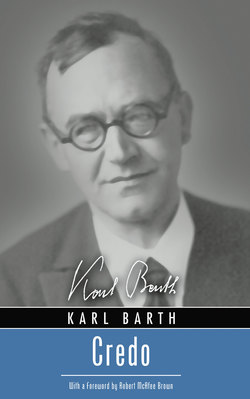Читать книгу Credo - Karl Barth - Страница 5
На сайте Литреса книга снята с продажи.
ОглавлениеFOREWORD
ROBERT McAFEE BROWN
Professor of Religion in the Special Programs in Humanities, Stanford University
CAN a book originally published in 1935 fairly represent the author’s point of view over a quarter of a century later? Particularly can this be so when the author in question is Karl Barth, a man who has gone through a long and radical theological pilgrimage?
When one glances over the course of Barth’s pilgrimage, one notes certain milestones along the way, certain points at which the path shifted in a new and decisively different direction. There is the original Epistle to the Romans of 1919, wholly re-written in 1922, replete with references to Kierkegaard, existentialism, the “totally other” and “the infinitely qualitative distinction between God and man.” There is the Christliche Dogmatik of 1927, in which Barth set forth a whole theological program to be elaborated in future volumes. This venture was halted almost as soon as it was underway, for in 1931 appeared a decisive volume, a work on Anselm, in which Barth re-thought the nature of the theological task in the light of the Anselmic credo ut intelligam. The result was that the Christliche Dogmatik was scrapped, and rewritten with a new title, Kirchliche Dogmatik (Church Dogmatics), the first volume appearing in 1932. From this point on, Barth has pursued a generally consistent course. As successive volumes of the Church Dogmatics have appeared (and at this moment there are twelve, with at least two more promised), the shift, if there has been one, has only been toward what one of Barth’s critics refers to as a greater and greater “Christological concentration.”
In other words, the main lines of Barth’s theological position had been secured by 1932, three years before the appearance of Credo. The latter is not, therefore, a “transition” volume, of interest only to those who wish to trace stages in Barth’s development. While Barth would certainly say some things differently today (retracting, no doubt, his words about Sacraments in the closing pages) it is little short of amazing, reading Credo retrospectively in the light of the full Church Dogmatics, how much of the latter is here in nuce in this small book. The dissatisfaction with “natural theology,” the centrality of Christology, the sheer “givenness” of the gift of grace to the undeserving, the recognition that we cannot really see the enormity of sin until we have been captured by the vastness of grace, the Christian life as the life of gratitude in response to the greatness of what God has done, the glad certainty that in Christ sin and death have truly been conquered and that a new situation is therefore always before us—these and other themes that the Church Dogmatics spells out over hundreds of pages, confront us here in a paragraph, a page, a chapter, in such a way that we discover that for Barth the tasks of exegete and preacher, scholar and proclaimer, teacher and witness, are all combined in one vocation.
That there is particular urgency behind these lectures is made clear by the date. They were given when the shadow of Hitler had already fallen across Europe. Evil days were ahead. Right conviction was important as a basis for right action, and Barth felt, properly, that wrong conviction could lead to wrong action. Then as now, reflection upon an historic utterance of the faith was not an evasion of the present, but a means of arming one’s self to live responsibly in the present.
The reader has the privilege of disagreeing with Barth. He no longer has the privilege of ignoring him.
